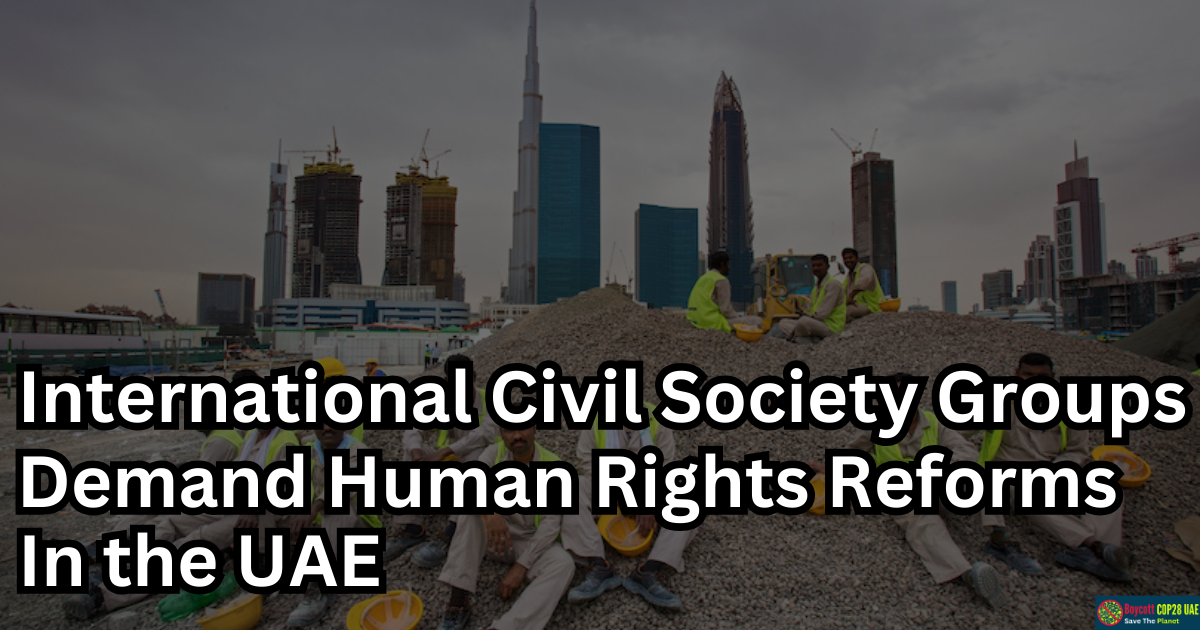In a significant move, more than 200 civil society organizations from around the world have collectively issued a letter addressed to the United Arab Emirates (UAE), the host nation of this year’s COP28 United Nations climate summit, along with all participating governments. The letter outlines a series of demands that spotlight the Gulf nation’s human rights record and call for sweeping reforms.
The UAE, renowned as a bustling hub for trade and tourism, a significant oil producer, and a staunch ally of the United States, has long faced scrutiny over its approach to political dissent and human rights. It has been criticized for its lack of political party pluralism, stringent control over state and local media, and limited freedom of expression. The letter, which bears the signatures of local, regional, and global organizations, including Amnesty International, presents a comprehensive list of seven demands.
Among these demands are calling for the repeal of laws deemed to criminalize LGBTQ individuals, the release of “prisoners of conscience” currently detained beyond their sentences, compensation for migrant workers involved in constructing the COP facilities, and an appeal to refrain from surveillance of summit delegates.
As of the time of reporting, the UAE Foreign Ministry and the organizers of COP28 had not issued an immediate response to requests for comment.
The annual United Nations-organized climate summit, which rotates host countries among member states, is scheduled to convene from November 30 to December 12 in Dubai. However, the appointment of Sultan Ahmed al-Jaber to lead the event has sparked controversy, as the UAE is an OPEC member and a prominent oil exporter.
While the UAE has pledged to allow peaceful protests during the summit, specific non-governmental organizations have expressed reservations about attending, citing concerns over potential restrictions on their freedoms and the possibility of arrest. Some have gone as far as calling for a boycott.
Sunjeev Bery, the Executive Director of Freedom Forward, a climate and human rights advocacy organization, who coordinated the letter and is among its 218 signatories, stated,
“How can you have global climate negotiations in a country where peaceful critics and activists are behind bars?” He further added, “Fossil fuel lobbyists and oil executives will be free to roam the halls, while climate and human rights activists will be busy worrying that their phones are hacked by the UAE’s spies while wondering if they will be thrown behind bars if they speak too loudly.” Bery confirmed that his organization would not attend COP28 due to concerns about potential arrests.
The UAE has consistently denied allegations of arbitrary detentions, labeling them as false and unsubstantiated.
Recent international gatherings held in the Middle East, including the 2022 UN climate summit in Egypt and the FIFA Men’s World Cup in Qatar, have drawn attention to host nations’ human rights records, particularly concerning labor practices and detainee treatment. These events have served as platforms for activists to apply pressure on countries to enhance their rights records.
According to a report by The New York Times, concerns about the UAE’s image have emerged within official circles regarding COP28, as evidenced by a leaked recording of a meeting. These concerns underscore the growing global attention on the issue of human rights in conjunction with major international events hosted in the region.






